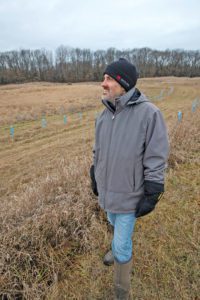Adopting climate-friendly practices is financially risky for small diversified farms because existing federal carbon-reduction incentives are geared to crops grown on an industrial scale. The $4.7 million Michigan Climate-Smart Farm Project (MCSFP) will instead measure the climate footprint of an entire farm—and assess ways of sequestering carbon that can be scaled for any size or type of farm.
Megan DeLeeuw, executive director of the WCCD and a small farm owner, spearheaded the project. She explains that implementing climate-friendly practices is costly, but USDA programs to subsidize it are impractical for small farms. “The federal government has a reputation for complex cost-sharing and technical applications and this request is to simplify this,” she says. “We seek to de-risk the process for farmers quickly and upfront” with a cost-sharing model that works for small farms.

WCCD vice chair Shannon Brines. Even if his farm isn’t part of the pilot project, he’ll play a role as a mapping specialist at U-M SEAS.
Thanks to lobbying by senator Debbie Stabenow, who chairs the Committee on Agriculture, Nutrition, and Forestry, the Inflation Reduction Act includes $40 billion to help farms reduce their environmental impact and become more climate resilient. Much of the money will be funneled through the Natural Resource Conservation Service and in an unusual step, program outreach and applications will target small farms.
Climate impact “is something I consider heavily with every design decision that takes place regarding our farm systems and operation,” emails WCCD vice chair Shannon Brines, a small farm owner and lecturer at the U-M School for Environment and Sustainability (SEAS). “One of the guiding tenets of our farm since inception in 2004 was to create a farm with minimal ecological and climate footprint.” If his farm is selected for the pilot project, it “will be a great opportunity to more formally measure how we are stacking up.”
“I’m excited for the Conservation District and what this grant will mean for the county,” says deputy county administrator Andrew DeLeeuw. DeLeeuw was the staff lead on the Resilient Washtenaw Climate Action Plan that commissioners approved in December, and will be involved in its implementation. He also happens to be Megan DeLeeuw’s husband.
“We have estimates in terms of where emissions come from in the county but our estimates for the agricultural sector aren’t super useful at this point,” he says. “What we’re excited to learn from the Climate Smart Farm Program is the carbon impacts of farm operations both in terms of supporting the county’s climate goals and helping the farms to become more resilient.”
The verification program is based on a model created by the Michigan Agriculture Environmental Assurance Program (MAEAP) that pays farmers to implement sustainable agricultural practices. Megan DeLeeuw acknowledges that determining how to pay farmers like Brines who are already using climate-smart practices will be a challenge, but “while some may not be eligible for cost-sharing they can quickly get certified,” whereas conventional farmers not using climate-smart practices will need much more support on the journey to certification.
Brines believes the WCCD is uniquely qualified to lead this effort. “Conservation districts have a long history of helping farmers take part in farm-bill-funded programs as well as state programs like MAEAP,” he explains. “They understand the verification techniques those programs use, plus have the flexibility to explore new programs that could help expedite the adoption of climate-smart practices.”
Partners in the project include the Michigan Department of Agriculture, U-M SEAS, and national nonprofits, as well as nonprofits and conservation districts in the Lake Erie basin. In the first phase, twelve farms across the basin will be paid to collect data that will be used “to figure out a simple way to measure and define what is a climate smart farm,” he says.
Whether or not his farm is included, Brines will work on the project as a mapping specialist with SEAS and as a liaison between the university research team and project partners. The bulk of SEAS’s involvement will be via specialists at the Center for Sustainable Systems who will work on a methodology for quantifying a farm’s baseline carbon footprint and how to adjust that based on new “climate-smart” practices.
In Phase 2, thirty farms will participate in the newly created verification system. That will let them benefit from cost-sharing incentives to implement climate-smart practices and use a new “Climate-Smart Farm” branding. At the conclusion of the pilot, the program will be pitched to the state agriculture department to adopt permanently, so that any Michigan farm can be certified.
Because climate impact is not accounted for by the current organic label, that could give the state’s most environmentally responsible farms a marketing edge.

